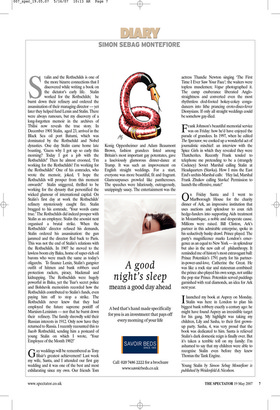S talin and the Rothschilds is one of the more bizarre
connections that I discovered while writing a book on the dictator’s early life. Stalin worked for the Rothschilds; he burnt down their refinery and ordered the assassination of their managing director — yet later they helped fund Lenin and Stalin. There were always rumours, but my discovery of a long-forgotten memoir in the archives of Tbilisi now reveals the true story. In December 1901 Stalin, aged 23, arrived in the Black Sea oil port Batumi, which was dominated by the Rothschild and Nobel dynasties. One day Stalin came home late boasting, ‘Guess why I got up so early this morning? Today I got a job with the Rothschilds!’ Then he almost crooned, ‘I’m working for the Rothschilds! I’m working for the Rothschilds!’ One of his comrades, who wrote the memoir, joked, ‘I hope the Rothschilds will prosper from this moment onwards!’ Stalin sniggered, thrilled to be working for the dynasty that personified the wicked glamour of international capital. On Stalin’s first day at work the Rothschilds’ refinery mysteriously caught fire. Stalin bragged to his comrade, ‘Your words came true.’ The Rothschilds did indeed prosper with Stalin as an employee. Stalin the arsonist next organised a brutal strike. When the Rothschilds’ director refused his demands, Stalin ordered his assassination: the gun jammed and the director fled back to Paris. This was not the end of Stalin’s relations with the Rothschilds. In 1907 he moved to the lawless boom city Baku, home of super-rich oil barons who were much the same as today’s oligarchs. To finance Lenin, Stalin’s gangster outfit of hitmen and bank robbers used protection rackets, piracy, blackmail and kidnapping. The Rothschilds were hugely powerful in Baku, yet the Tsar’s secret police and Bolshevik memoirists recorded how the Rothschilds contributed to Stalin’s funds, even paying him off to stop a strike. The Rothschilds never knew that they had employed the future supreme pontiff of Marxism-Leninism — nor that he burnt down their refinery. The family shrewdly sold their Russian interests in 1912. Only now have they returned to Russia. I recently recounted this to Jacob Rothschild, sending him a postcard of young Stalin on which I wrote, ‘Your Employee of the Month 1902!’ Gay weddings will be remembered as Tony Blair’s greatest achievement! Last week my wife, Santa, and I attended our first gay wedding and it was one of the best and most exhilarating since my own. Our friends Tom Konig Oppenheimer and Adam Beaumont Brown, fashion grandees listed among Britain’s most important gay potentates, gave a lasciviously glamorous dinner-dance at Tramp. It was such an improvement on English straight weddings. For a start, everyone was more beautiful, fit and fragrant. Glamourpusses prowled like pantheresses. The speeches were hilariously, outrageously, unzippingly saucy. The entertainment was the actress Thandie Newton singing ‘The First Time I Ever Saw Your Face’; the waiters were topless musclemen; Vogue photographed it. The camp exuberance liberated Anglostraightness and converted even the most rhythmless clod-footed hokey-cokey congadancers into lithe prancing eroto-disco-fever Dionysians. If only all straight weddings could be somehow gay-ified.
Frank Johnson’s beautiful memorial service was on Friday: how he’d have enjoyed the parade of grandees. In 1997, when he edited The Spectator, we cooked up a wonderful act of journalistic mischief: an interview with the Spice Girls in which they revealed they were Thatcherites. Recently Frank tended to telephone me pretending to be a (strangely Cockney) Soviet Marshal calling Stalin at Headquarters (Stavka). How I miss the East End’s urchin-Marshal calls: ‘Hey lad, Marshal Frank Zhukov calling Stavka! Permission to launch the offensive, mate!’ On Friday Santa and I went to Marlborough House for the charity dinner of Ark, an impressive institution that uses auctions and splendour to coax rich hedge-funders into supporting Aids treatment in Mozambique, a noble and desperate cause. Millions were raised. Bill Clinton, Ark’s partner in this admirable enterprise, spoke in his seductively husky drawl. Prince played. The party’s magnificence marks London’s emergence as an equal to New York — in splendour but also in the new cult of philanthropy. It reminded me of history’s most extravagant ball: Prince Potemkin’s 1791 party for his partnerin-power-and-love, Catherine the Great. He was like a rock star and statesman combined: the prince also played his own songs, not unlike the pop star Prince. Potemkin served puddings garnished with real diamonds, an idea for Ark next year.
Ilaunched my book at Asprey on Monday. Stalin was here in London to plan his biggest bank robbery exactly a century ago: he might have found Asprey an irresistible target for his gang. My highlight was taking my children, Lily and Sasha, to their first grownup party. Sasha, 4, was very proud that the book was dedicated to him. Santa is relieved Stalin’s dark domestic reign is finally over. But it’s taken a terrible toll on my family: I’m ashamed to say that my children were able to recognise Stalin even before they knew Thomas the Tank Engine.










































































 Previous page
Previous page